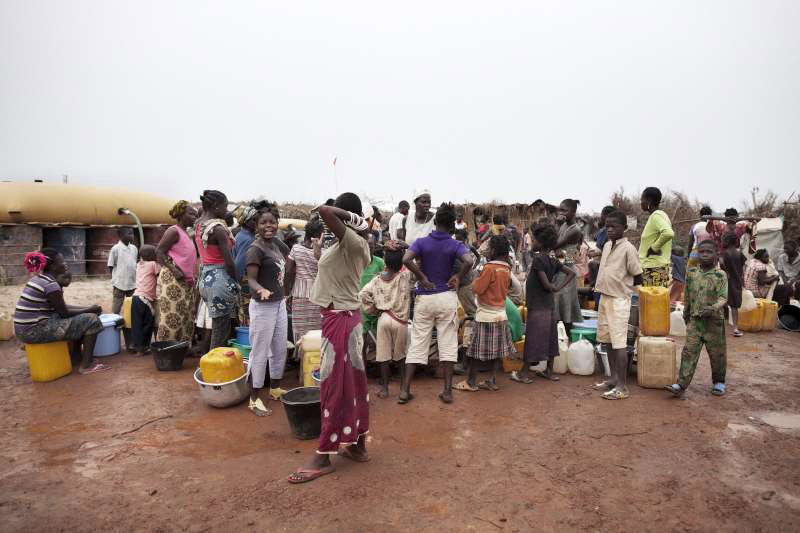December 25, 2025 02:21 pm (IST)

UN concerned over latest fighting in northern CAR
New York, May 17 (IBNS): As fighting worsens in northern Central African Republic, United Nations humanitarian agencies and partners are working to protect displaced people and children, and to support conflict-hit farmers, it was announced on Friday.
More than 23,000 people were displaced in the Kaga Bandoror area as of 2 May, a figure nearly double from the level a month earlier, UN Refugee Agency (UNHCR) spokesperson Adrian Edwards confirmed.
Briefing journalists in Geneva, Edwards said the “most of the displaced are Christians, mainly women and children. Many of the men are hiding due to fear of attacks by armed groups.”
“The displaced urgently need physical protection, food, non-food items, water and sanitation, and other help,” he said.
Although some food support is being provided by UNHCR’s partner agencies, people are fast consuming their own food reserves, and are unable to cultivate their fields due to fear of attacks.
There is already a high prevalence of diarrhoea reported among children, he added.
Young people in the area are also in danger of being recruited by armed forces, not only as combatants, but also as cooks, porters and guards.
The UN Children’s Fund (UNICEF) and partners secured the release of more than 1,000 children from armed groups in the CAR this year. That is more than five times the total number of children released in 2013, according to the UN agency spokesperson Christophe Boulierac.
However, thousands more children remain among the ranks of armed groups. Since violence escalated in December last year, their estimated number nearly doubled from 3,500 to around 6,000.
“The growing number of children who continue to be used in this brutal fighting is yet another reminder of the unspeakable atrocities children are living every day,” said Souleymane Diabaté, UNICEF Representative in CAR, in a press statement released on Friday.
“Every single child we spoke to said they wanted to leave the armed group and return to school. We cannot fail them,” Diabaté urged, noting a USD 7.6 million budget gap for child protection programmes for the rest of this year.
Working with partners, UNICEF supports children released from armed groups by providing health care, psychosocial support, family tracing and reunification, and return to school or accelerated learning and vocational training.
Speaking at the UN Headquarters in New York earlier this week, Diabaté said children in CAR are witnessing terrible violence in what has become a “forgotten crisis” as compared with the media coverage of Syria and Ukraine. He urged the international community to ‘stand up’ and stop and help end the crisis as soon as possible.
Fighting in CAR has taken on an increasingly sectarian nature following a 2012 rebel-led coup and has since become more brutal with reports of ongoing human rights violations and clashes that have left 2.2 million in need of humanitarian aid.
Also on Friday, the UN Food and Agricultural Organization (FAO) announced that it was launching its “largest ever intervention in the country” aimed at helping families feed themselves even as the fighting continues.
Each family receives 25 kg of seeds and two hoes so that they can produce at least 500 kg of groundnuts, maize and rice to contribute to feeding them for around four months, according to a news release.
In addition to the seeds, each family receives food rations so that desperate families are more likely to plant the seeds than eat them.
“The delivery of these agricultural kits is of critical importance since they will help avert a full-scale food and nutrition crisis in the country,” said acting FAO Representative Alexis Bonte.
FAO, in coordination with 16 non-governmental organizations, has already distributed kits to more than 11,660 families.
(Internally displaced Central Africans gather to collect water. The needs of the newly displaced are great. Photo: UNHCR/A. Greco)
Support Our Journalism
We cannot do without you.. your contribution supports unbiased journalism
IBNS is not driven by any ism- not wokeism, not racism, not skewed secularism, not hyper right-wing or left liberal ideals, nor by any hardline religious beliefs or hyper nationalism. We want to serve you good old objective news, as they are. We do not judge or preach. We let people decide for themselves. We only try to present factual and well-sourced news.
Support objective journalism for a small contribution.
Latest Headlines
Zelenskyy’s demilitarised zone gambit: Ukraine’s 20-point peace plan puts Donbas, NATO-style guarantees at centre stage
Wed, Dec 24 2025
Conspiracy clouds Libyan army chief’s death: Plane crash in Turkey follows Asim Munir's meeting with rebel Khalifa Haftar
Wed, Dec 24 2025
Bamako under siege: Al-Qaida-linked JNIM pushes Mali—and West Africa—toward a security breaking point
Tue, Dec 23 2025
Who Is Lieutenant General Fanil Sarvarov? Senior Russian military officer killed in Moscow car bomb attack
Mon, Dec 22 2025
From Kabaddi to Courtroom: Three Indian-origin men sent to prison over violence during 2023 UK kabaddi event
Sun, Dec 21 2025
South Africa hit by second mass shooting this month; 10 dead
Sun, Dec 21 2025







